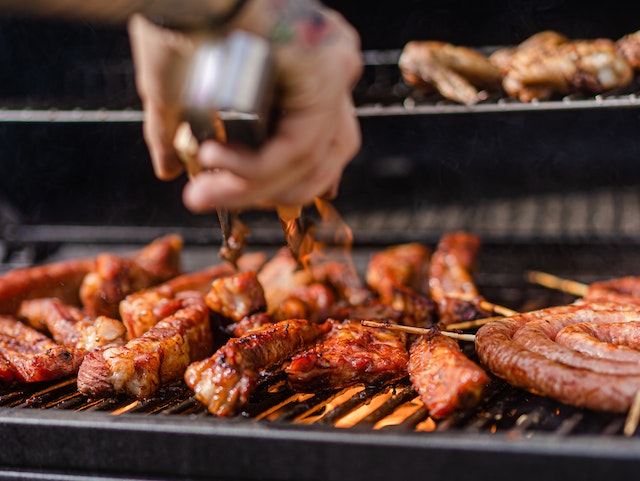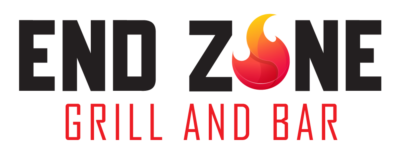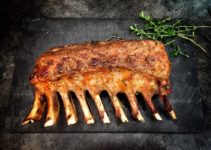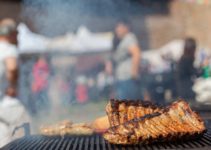
Gas Vs Propane Grill: What Are the Differences?
Summertime is the perfect time to dust off your grill and invite friends and family over for a cookout. While hot dogs and hamburgers are always popular choices, why not mix things up this year with some different types of grilled meats? But what type of fuel should you use to get your grill burning? Keep reading for a guide on the different types of fuel available for grilling!
There are many factors to consider when deciding which type of grill to purchase. Gas vs propane grills have some similarities, but there are also some key differences that you should be aware of before making your decision. In this blog post, we will outline the pros and cons of gas and propane grills so that you can make an informed decision about which type is right for you. Keep reading to learn more!
Table of Contents
What Is Gas Grill?
A gas grill is a kitchen appliance designed for the purpose of cooking food. Gas grills come in a variety of shapes and sizes, and can be used for both indoor and outdoor cooking. The most common type of gas grill is the freestanding model, which is designed to be placed on a table or countertop. Some gas grills are also built into cabinets or other storage units, making them more permanent fixtures in the kitchen. Gas grills typically use either propane or natural gas as their fuel source.
Gas grills usually have one or more burners that use an open flame to heat the food. Most models also have a side burner, which can be used to cook sauces or side dishes. Some gas grills also come with a rotisserie attachment, which allows the user to slow-cook meats. Most gas grills have a control panel that allows the user to regulate the temperature of the grill, as well as the amount of time the food is cooked.
When shopping for a gas grill, it is important to consider the size and shape of the unit, as well as the number of burners. It is also important to decide whether you want a freestanding or built-in model. Built-in models are usually more expensive than freestanding models, but they offer more cooking space and tend to be more durable. If you plan to use your grill regularly, it is worth investing in a quality unit that will last for many years.
The Pros And Cons Of Gas Grill
There are many different types of grills on the market, and each has its own set of pros and cons. One type of grill that has become increasingly popular in recent years is the gas grill. Gas grills offer a number of advantages over other types of grills, but they also have some disadvantages that you should be aware of before making a purchase.
The Pros:
– Gas grills tend to heat up more quickly than charcoal or electric grills, so you can get started cooking sooner.
– Gas grills provide more consistent heat, which means your food will cook more evenly.
– Gas grills are typically less messy than charcoal grills, as there is no need to deal with ashes or charred briquettes.
– Many gas grills come with side burners that can be used for simmering sauces or cooking side dishes.
– Gas grills are generally more durable than charcoal grills, so you can expect them to last longer.
The Cons:
– Gas grills can be more expensive than charcoal or electric grills, so you’ll need to factor that into your budget.
– Gas grills require regular maintenance, such as cleaning the burner jets and making sure the gas tank is full.
– If you don’t have access to a natural gas line, you’ll need to use propane tanks, which can be expensive to replace.
– Gas grills can produce harmful byproducts, such as carbon monoxide, so it’s important to use them in well-ventilated areas.
– Some people prefer the taste of food cooked on a charcoal grill, so it’s a matter of personal preference.
If you’re considering purchasing a gas grill, weigh the pros and cons carefully to decide if it’s the right choice for you.
What Is Propane Grill?
A propane grill is a type of grill that uses propane gas as its fuel source. Propane grills typically have two or more burners, and the heat produced by the burning propane is used to cook food placed on a grill rack above the burner(s).
Propane grills are very popular for outdoor cooking, as they are relatively easy to set up and use, and can be used in both warm and cold weather. Propane is also an inexpensive fuel source, making propane grills a cost-effective option for many people.
If you are considering purchasing a propane grill, there are a few things to keep in mind. First, you will need to have a supply of propane gas. Most grills use small tanks of propane that must be refilled regularly, so it is important to make sure you have a steady supply of propane before using your grill.
Second, you will need to know how to properly operate your grill. Propane grills can be dangerous if not used correctly, so it is important to read the instructions carefully and follow them closely. Never leave a lit grill unattended, and always make sure the area around the grill is clear of any flammable materials before igniting the burner(s).
Third, you will need to make sure your grill is properly ventilated. Propane grills produce a lot of smoke, so it is important to have good ventilation in the area where you will be using the grill.
Fourth, you should always use caution when handling hot grill surfaces. Always use gloves or tongs when handling hot grill racks or surfaces, and never touch the burner(s) with your bare hands.
Fifth, you should never store propane tanks inside your home or garage. Propane is highly flammable, and if a tank were to leak, it could cause a fire or explosion. If you must store propane tanks inside, make sure they are in a well-ventilated area away from any heat sources.
Sixth, you should never use a propane grill indoors. Propane grills produce a lot of smoke and can be very dangerous if used indoors. If you must use a propane grill indoors, make sure the area is well ventilated and away from any heat sources.
By following these simple tips, you can help to ensure that your propane grill is safe and enjoyable to use. Propane grills are a great way to enjoy outdoor cooking, but they must be used safely in order to avoid accidents.
The Pros And Cons Of Propane Grill
When it comes to grilling, there are a lot of different options out there. One type of grill that has become increasingly popular in recent years is the propane grill. Propane grills offer a number of advantages over other types of grills, but they also have some disadvantages. Here are some of the pros and cons of propane grills:
The Pros:
– Propane grills heat up quickly and evenly, so you can start cooking your food right away.
– They are very versatile and can be used for both cooking and smoking food.
– Propane grills are easy to clean since the burner is sealed off from the rest of the grill.
– They are relatively inexpensive and can be found at most hardware stores.
The Cons:
– If you run out of propane while cooking, you will have to wait for the grill to cool down before you can add more.
– Propane grills can be difficult to light if the igniter is not working properly.
– The flame on a propane grill can be hard to control, so it is easy to overcook food.
– Propane grills produce a lot of smoke, so they are not ideal for cooking in enclosed spaces.
Overall, propane grills offer a lot of advantages over other types of grills. However, they also have some disadvantages that you should be aware of before you purchase one.
Gas Vs Propane Grill Comparison
Grilling is a popular summer pastime, and there are many different types of grills to choose from. Gas grills are a popular option because they’re convenient and easy to use. Propane grills are another option that offer many benefits, including cost savings and environmental friendliness. So, which type of grill is right for you? Here’s a comparison of gas and propane grills to help you decide.
– Convenience: Gas grills are typically more convenient than propane grills. They’re easy to set up and don’t require any special equipment or knowledge. Propane grills can be just as easy to use, but they may require some extra setup time to ensure that the fuel tank is properly connected.
– Cost of Gas: Gas is typically more expensive than propane, so running a gas grill can cost more money. However, propane is not always less expensive than gas. In some cases, the price of propane may be higher than the price of gas.
– Energy Efficiency: Propane grills are generally more energy-efficient than gas grills. This means that they use less fuel to produce the same amount of heat, which can save you money in the long run.
– Environmental Impact(gas vs propane grill): Propane is a cleaner-burning fuel than gas, so it produces fewer emissions. This can be better for the environment and your local air quality.
– Portability: Both gas and propane grills are portable, so you can take them with you when you travel. However, propane grills are typically smaller and lighter than gas grills, so they’re easier to transport.
– Safety: Gas and propane grills both pose a risk of fire if they’re not used properly. However, propane is a highly flammable fuel, so it poses a greater risk than gas. Propane grills should be used with caution, and you should always follow the manufacturer’s safety instructions.
– Setup Costs: Gas grills usually cost more to set up than propane grills. This is because you need to install a gas line to connect the grill to your home’s natural gas supply. Propane grills only require a connection to a propane tank, which is typically less expensive than installing a gas line.
So, which type of grill is right for you? Gas grills are more convenient and easier to use, but they may cost more to operate. Propane grills are more energy-efficient and have a lower environmental impact, but they may be more expensive to set up. Ultimately, the decision comes down to personal preference and your own grilling needs.
FAQs About Gas Vs Propane Grill
Why Do My Gas Grills Keep Going Out?
One of the most common issues with gas grills is that the burner can become clogged with grease and debris. This can happen over time as you use your grill, and it can be difficult to clean out the burner properly. If you find that your gas grill keeps going out, it’s likely that the burner is clogged and needs to be cleaned.
How Do I Know If My Gas Grill Is Running Low On Propane?
Another common issue with gas grills is that they can run low on propane without notice. If you notice that your grill isn’t cooking as well as it used to or that the flame is lower than usual, it’s likely that your grill is running low on propane. You’ll need to refill your propane tank as soon as possible to avoid any issues with your grill.
How Often Should I Clean My Gas Grill?
It’s important to clean your gas grill regularly to prevent grease and debris from building up on the burner. You should aim to clean your grill at least once a month, but more frequently if you use it often. Be sure to follow the manufacturer’s instructions when cleaning your grill to avoid damaging it.
My Gas Grill Won’t Light – What Should I Do?
If your gas grill won’t light, the first thing you should check is the igniter. If the igniter is broken or damaged, it will need to be replaced. You can usually find replacement igniters at your local hardware store. If your grill still won’t light after replacing the igniter, you may need to call a professional for help.
I Think There’s A Gas Leak In My Grill – What Should I Do?
If you suspect there’s a gas leak in your grill, it’s important to take action immediately. Turn off the gas supply to your grill and call a professional for assistance. Do not attempt to repair the leak yourself as this could be dangerous.
What Is The Best Way To Store My Gas Grill?
It’s important to store your gas grill properly when you’re not using it to prevent rust and damage. Be sure to clean your grill thoroughly before storing it, and always cover it to protect it from the elements. You should also store your propane tank in a cool, dry place away from heat sources.
How Do I Know If My Grill Is Running Out Of Propane?
There are a few warning signs that indicate your grill is running low on propane. First, check the flame. If it’s low or flickering, that’s a good indication that the tank is almost empty. Second, listen for a hissing sound. This usually means there’s a leak in the hose or connections. Finally, if the grill isn’t producing as much heat as it normally does, that’s another sign that the propane is running low.
What Should I Do If My Grill Runs Out Of Propane?
If your grill runs out of propane, don’t panic. First, check all of the connections to make sure there are no leaks. Then, turn off the gas at the tank and call your local propane provider to have the tank refilled.
How Long Will A Tank Of Propane Last?
The amount of time a tank of propane will last depends on a few factors, including the size of the grill and the heat setting. In general, a small propane grill will use about 1-2 lbs of propane per hour, while a larger grill can use up to 4 lbs per hour.
Can I Store My Propane Tank Indoors?
No, you should never store your propane tank indoors. Propane is a highly flammable gas, so it needs to be stored in a well-ventilated area away from any potential sources of ignition. If you must store your tank inside, make sure to keep it in an upright position and away from any heat sources.
What Are The Signs Of A Propane Leak?
The most common sign of a propane leak is a hissing sound coming from the hose or connections. Another sign is a sudden drop in pressure on the gauge. If you suspect a leak, turn off the gas at the tank and call your local propane provider for assistance.
How Can I Prevent My Grill From Rusting?
Rust can form on any metal surface, but it’s especially common on grills. To help prevent rust, make sure to clean your grill regularly and to cover it when it’s not in use. You can also buy a special grill cover that’s made out of weather-resistant material.
>>> See more: How To Light a Propane Gas Grill(Gas vs propane grill)
Conclusion
So, what’s the final verdict? Is propane better than gas for grilling? The answer is a little more complicated than a simple yes or no. It depends on your needs and preferences. If you want an easier-to-use grill that doesn’t require any refills, then gas is probably the better option for you. But if you don’t mind dealing with a bit of setup and are looking for cheaper fuel costs in the long run, go with propane. No matter which type of grill you choose, make sure to do your research before buying and read reviews from other customers to get an idea of what to expect. Now that you know all about gas vs propane grills, it’s time to start shopping for your perfect backyard cooker!
Read more:
Liquid Propane Vs Natural Gas Grill: Which is Better and Why?



